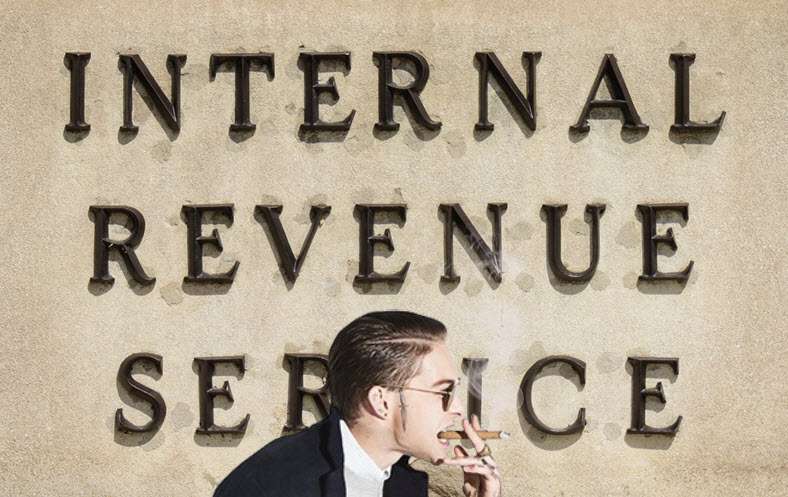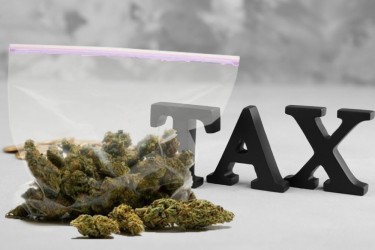
The IRS comes out clean on marijuana and cryptocurrency taxation, is legalization next?
Whenever the Internal Revenue Service (IRS) is hosting an event in any business sector, it is usually a sign that the industry has excellent potential for high revenue.
The cryptocurrency industry is currently valued at $ 2.48 trillion, a jump from its $ 1 trillion value at the beginning of the year. The marijuana industry is valued at $ 118.9 billion, a breakthrough increase from $ 20.6 billion in 2019.
Despite the federal government’s reluctance to legalize and adopt both sectors, the revenues they generate, which fuel the country’s economy, cannot be ignored. So when the IRS hosted the tax event for both sectors, crypto and cannabis enthusiasts wondered whether it was a move towards legalization or government support.
The tax event
Last Wednesday, the IRS held a forum organized to discuss tax policy for cannabis and cryptocurrency companies. The meeting was chaired by a representative from the National Association of Tax Professionals (NATP) and highlighted a number of issues that affect both companies.
Issues discussed included allowing tax deductions as marijuana remains illegal at the federal level. Also the question of how different states tax cannabis and pay taxes on profits from cryptocurrencies.
During a panel discussion at the event, increasing support for marijuana legalization and the possibility of federal reform were discussed.
The promotional materials for the forum said attendees would find ways to file a tax return for “illegal” activity and understand when digital currencies should be declared as taxable income.
Attendees also included tax professionals trying to understand the crypto and marijuana markets. The event provided an overarching overview of some of the unique financial challenges facing both markets.
What do crypto and marijuana have in common?
Cryptocurrencies and marijuana share a common challenge: the federal ban. Until the federal government decides to legalize them, such forums are always organized to explain how illegality works with taxes.
A greater number of states in America have still not legalized marijuana in some forms. The illegal status under the Controlled Substances Act implies that cannabis companies can deduct the standard cost like other regulated markets. The moderator of the event confirmed this as it is included in regulation 280E of the tax laws.
The moderator also stressed that even if a company is labeled “illegal”, marijuana companies will still have to pay federal taxes. He claimed that there was a small amount of deduction from disclosing the cost of goods to manufacturers and dealers.
A slide from the IRS presentation showed a poll of Americans opposed to the marijuana ban. The presentation also provided an overview of the economic opportunities of the cannabis market, which is of great interest to the IRS.
A summary of the statistics shared at the event is as follows:
The National Association of Tax Professionals was led by their accountant, who also hosted a panel discussion focused on the Senate’s efforts to legalize marijuana. The main focus was on the contributions of the Senate Majority Leader Chuck Schumer, who submitted a draft to the Senate last month.
The accountant said he believes the Senate-level effort is significant as talks about legalizing cannabis become “mainstream”. He goes on to claim that the next question and challenge will be to legalize them if America regulates its legislation properly.
The IRS tax preferences for states with legal cannabis markets
In early 2021, IRS Commissioner Charles Retting told Congress that the agency preferred state cannabis companies to pay their taxes electronically. This request resulted from the inefficiency of the current cash system that exists because cannabis is still federally illegal.
The IRS, like many other organizations and individuals who have asked the federal government to reconsider its stance, believes that the cash system poses a risk to workers.
Steven Mnuchin, the former Treasury Secretary, said in 2019 that he would prefer Congressional approval of the bill that solves the marijuana banking challenge. He claimed that the IRS, which is building cash rooms to pay taxes to cannabis companies, is demonstrating the problem with the cash system.
Last year the IRS released updated tax policy guidelines for cannabis companies, including instructions on how marijuana companies without access to bank accounts can pay copious amounts of money as taxes.
The update is in response to a report released by the treasury department last year. The ministry’s inspector general for taxes initially criticized the IRS for failing to adequately advise marijuana companies that are taxpayers to comply with federal tax laws. Therefore, the finance department hired the agency to prepare and publish the guidance document, which is aimed at the cannabis industry and helpful to any entrepreneur in this sector.
The IRS Small Business / Self Employed Department Representative attended a forum on marijuana in December. At the event, he mentioned that the legalization discourse is gaining momentum. He also claimed the movement would manage to end the state ban.
Bottom line
That the IRS is holding an event on two fundamental, but unfortunately still illegal, markets in America is a positive sign. While they have insisted that this is not a sign of imminent legalization, cannabis and crypto enthusiasts can’t help but remain optimistic.
One thing is certain, especially for the future of the cannabis market. Pretty soon, it’s going to get this big, bringing in billions of dollars that the federal government can’t ignore. Until then, states where marijuana is already legal will benefit. This situation should teach the federal government that the marijuana and crypto markets will thrive with or without them.
THE IRS ON WEED, READ MORE …

WHAT IS THE 280E CONTROL CODE FOR MARIJUANA? CLICK HERE!

Post a comment: